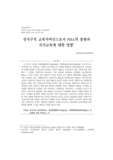

PARTNER
검증된 파트너 제휴사 자료
전지구적 교육거버넌스로서 PISA의 출현과 국가교육에 대한 영향
방대한 850만건의 자료 중 주제별로 만들수 있는 최적의 산출물을 해피 캠퍼스에서 체험 하세요 전문가의 지식과 인사이트를 활용하여 쉽고 폭넓게 이해하고 적용할수 있는 기회를 놓치지 마세요
30 페이지
최초등록일 2015.03.25
최종저작일
2014.01

-
 * 본 문서는 배포용으로 복사 및 편집이 불가합니다.
* 본 문서는 배포용으로 복사 및 편집이 불가합니다.
미리보기
서지정보
· 발행기관 : 한국교육사회학회
· 수록지 정보 : 교육사회학연구 / 24권 / 3호
· 저자명 : 손준종
목차
Ⅰ. 서론
Ⅱ. 국제학업성취도평가(PISA)의 탄생: 표준화된 교육지표의 출현
Ⅲ. 전지구적 교육거버넌스로서 PISA의 성격과 통치 테크놀로지
Ⅳ. 전지구적 교육거버넌스로서 PISA의 국가교육에 대한 영향
Ⅴ. 결론
참고문헌초록
이 연구의 목적은 경제개발협력기구(OECD)의 국제학업성취도평가(PISA)를 ‘전지구적 교
육거버넌스’로 정의하고, 이러한 교육거버넌스가 어떻게 출현하고 제도화되었으며, 국가교육
에 어떠한 영향을 미치는가를 분석하는 것이다. PISA는 국가교육을 단일 기준에 따라 평가
하여 그 결과를 국제적으로 비교하고, 국가 순위표로 발표하는 표준화된 교육지표이다.
PISA는 미국을 비롯한 선진 자본주의 국가의 경제적 요구 때문에 출현하였다. OECD 회원
국을 포함하여 많은 비회원국들이 자발적으로 PISA에 참여함으로써 PISA는 전지구적으로
교육을 수렴시키는 역할을 하고 있다. PISA는 물리적 강제가 아니라 자발적으로 참여하도록
한다는 점에서 연성 거버넌스의 특징을 보인다. 또한 국가교육을 객관적이고 과학적으로 평
가한다는 점을 강조하기 위해 평가 결과를 수량화된 지표로 재현한다. PISA는 국가별로 교
육관련 ‘데이터’를 국가별로 수집ㆍ분석하고, 국제적으로 ‘비교’하며, 그 결과를 근거로 국가
교육의 ‘책무성’을 판단한다. 또한 PISA는 국가교육이 ‘어떠해야 한다’는 규범적 판단을 내
리고, 국가별로 효과적인 정책을 권고하는 처방 기능을 한다. 국민국가는 여전히 교육에 관
한 가장 강력한 행위자로서의 위치를 유지하고 있으나, 앞으로 OECD를 비롯한 국제기구의
국가교육에 대한 영향은 지속적으로 확대될 것으로 예상된다. 따라서 초국가적 자본에 친화
적인 국제기구의 교육적 영향력을 견제하고 조정할 초국가적 시민사회의 교육거버넌스에의
참여를 확대할 수 있는 방안을 모색할 필요가 있다.영어초록
In this paper, I analyze the emergence of PISA as global educational governance and its
impacts on the State Education. OECD developed PISA to measure the quality of human capital
for the neo-liberal economy in an era of globalization. Advanced capitalist countries had a
strong need to develop educational assessment tools and indicators to internationally compare
and identify the strengths and weaknesses of their education system. PISA is the standardized
education indicator for comparative assessment of national education, and aims at assessment
education’s application to real-life problems and work-related skill and knowledge. PISA as
global educational governance has two major characteristics: ‘soft governance’ and ‘governance
by number’. Many countries voluntarily participate in PISA and are voluntarily governed by
PISA’s norms and rules. PISA results are represented using the number. International
comparisons, statistical data and accountability are the effective governance mechanisms of
PISA. PISA has negative effects on educational sovereignty and State educations' autonomy.
Even though the state education are still controlled and governed by the nation-state,
international organization like a OECD will continuously increase their influences on the state
education. Also, OECD/PISA will redefine the nature and practices of the modern education
system. In order to monitor transnational organization’s educational effects, the educational role
of the transnational civil society should be expanded and increased.참고자료
· 없음태그
-
자료후기
-
자주묻는질문의 답변을 확인해 주세요

꼭 알아주세요
-
본 학술논문은 (주)학지사와 각 학회간에 저작권계약이 체결된 것으로 AgentSoft가 제공 하고 있습니다.
본 저작물을 불법적으로 이용시는 법적인 제재가 가해질 수 있습니다. -
해피캠퍼스는 구매자와 판매자 모두가 만족하는 서비스가 되도록 노력하고 있으며, 아래의 4가지 자료환불 조건을 꼭 확인해주시기 바랍니다.
파일오류 중복자료 저작권 없음 설명과 실제 내용 불일치 파일의 다운로드가 제대로 되지 않거나 파일형식에 맞는 프로그램으로 정상 작동하지 않는 경우 다른 자료와 70% 이상 내용이 일치하는 경우 (중복임을 확인할 수 있는 근거 필요함) 인터넷의 다른 사이트, 연구기관, 학교, 서적 등의 자료를 도용한 경우 자료의 설명과 실제 자료의 내용이 일치하지 않는 경우
“교육사회학연구”의 다른 논문도 확인해 보세요!
-
대학생의 졸업 속도 영향요인에 대한 생존분석: 4년제 대학 여학생을 중심으로 25 페이지
본 연구는 4년제 대학에서 수학하고 있는 여대생들의 졸업 속도에 영향을 미치는 요인들 을 분석하고자 수행되었다. 이를 위해 한국교육고용패널(KEEP) 1∼8차년도 데이터를 사용하 여 생존분석 가운데 하나인 콕스비례위험모형(Cox proportional hazard model) 분석을 실시하 였다. 분석 결과, 여대생들의 졸업 속도에는 부모 학력, 대학원 진.. -
교육정보공개법의 정책 목표에 대한 비판적 검토 21 페이지
본 연구는 교육정보공개법의 정책 목표를 비판적으로 검토해 보았다. 이를 위해 먼저 교 육정보공개법안의 정책 목표를 맥락적으로 파악해 본 다음, 이를 명시적으로 표방된 정책 목표의 실제 의미와 비교해 보았다. 연구 결과는 다음과 같다. 교육정보공개법안의 정책 목 표를 동반 발의 법안과의 관계 속에서 파악해 본 결과, 그것은 학업성취도평가 결과의 공시 를 통한.. -
초등학교 6학년 담임교사 되기 33 페이지
본 연구는 초등학교 6학년 담임교사들에 대한 질적 연구를 통해, 6학년 담임교사들이 경 험하는 교직생활과 그에 대한 생각과 느낌을 솔직하게 보여주었다. 그 안에서 성장해가는 6 학년 담임교사의 특징을 추출해 내어 6학년 담임교사에 대한 이해를 넓히는 것이 연구의 목 적이다. 나아가 심화되고 있는 6학년 담임배정 기피 현상에 대한 해결책을 제시하여 올바른 초.. -
질적연구 방법과 교육의 평등: 혁신학교 사례를 중심으로 31 페이지
본 연구는 최근 우리나라 일부 시도교육청을 중심으로 추진되고 있는 혁신학교를 교육 평 등의 관점에서 재해석하고, 혁신학교가 교육의 평등을 적절히 실현하는 데 질적연구방법이 어떻게 기여할 수 있는지를 모색하는 데 목적이 있다. 최근에 일부 시도교육청에서 추진되고 있는 혁신학교가 궁극적으로 실현하고자 하는 것은 교육의 질적인 평등이라고 볼 수 있다. 그리고 그.. -
대안학교 졸업생은 어떤 삶을 살아가고 있는가? 35 페이지
대안교육을 받은 사람들은 과연 어떤 삶을 살아가고 있는가? 어떤 생각과 고민을 하며, 어떻게 자신의 삶을 이끌어가고 있는가? 청소년기에 받은 대안교육이 그들의 삶에 어떻게 영향을 미치고 있는가? 본 연구는 이러한 문제의식에서 출발하였다. 연구문제를 해결하기 위하여 대안학교 졸업생 29명이 대안학교에서 겪은 경험과 졸업 이후 자신들의 삶의 전개에 대해 집필하..
찾으시던 자료가 아닌가요?
지금 보는 자료와 연관되어 있어요!
문서 초안을 생성해주는 EasyAI


